Egypt-Israel Tensions Escalate Over Alleged Military Buildup
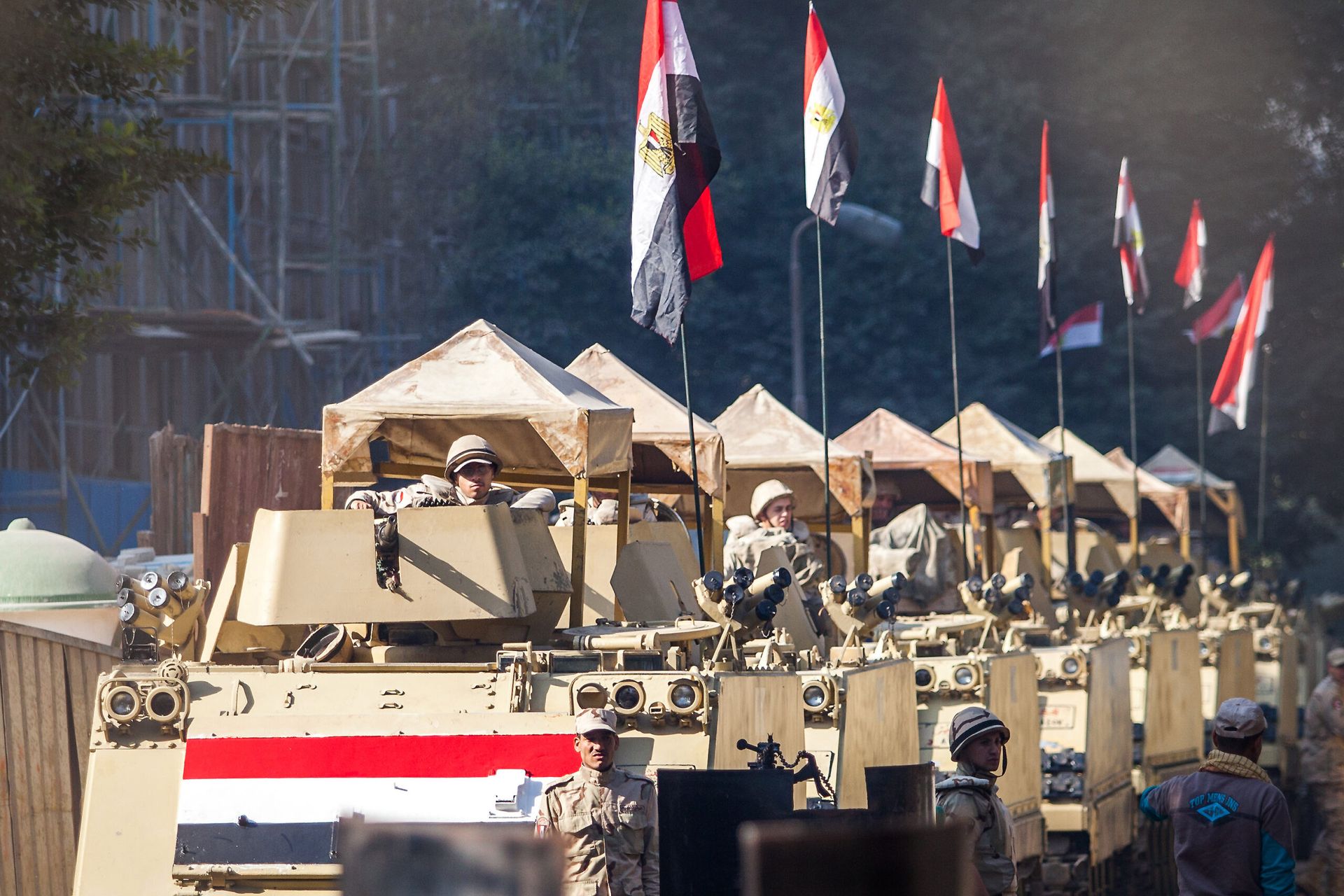
Reports of an alleged Egyptian military buildup near Israel’s border have escalated tensions between the two nations, with Israel expressing concerns over increased troop movements in the Sinai Peninsula. Social media footage and media coverage have shown Egyptian tanks near the Rafah crossing, fueling speculation about Cairo’s intentions. While Israeli officials perceive these developments as a potential security threat, Egyptian state media maintains that the deployments are part of long-standing counterterrorism efforts against insurgent groups in Sinai.

Under the 1979 Egypt-Israel peace treaty, any significant Egyptian military presence in Sinai requires Israeli approval and oversight by the Multinational Force and Observers (MFO). However, the MFO has refrained from commenting on recent troop movements, stating that its findings are exclusively shared with Egyptian and Israeli authorities. Independent analysts suggest that Egypt’s military activity appears defensive rather than offensive, aimed at maintaining strategic stability in the region. The Sinai Foundation for Human Rights (SFHR) has also noted only minor adjustments to Egypt’s military posture, contradicting claims of a significant escalation.
These developments unfold against a backdrop of shifting regional dynamics, particularly regarding Gaza’s future. Egypt and Jordan have strongly opposed any proposals to relocate Palestinians from Gaza, rejecting U.S.-backed plans for population transfers. Cairo has reiterated its commitment to Palestinian sovereignty and continues to play a central role in ceasefire negotiations alongside the U.S. and Qatar. Additionally, Egypt has led reconstruction efforts in Gaza, securing European and Gulf support to rebuild infrastructure while preventing forced displacement—a direct challenge to past proposals advocating for Gaza’s redevelopment into a “Gaza Riviera.”
Meanwhile, security challenges along the Egypt-Israel border have grown more complex. Israeli sources report a sharp rise in arms smuggling from Egypt, with intercepted shipments containing rifles, grenades, and other weapons. Egypt has historically cooperated with Israel in counterterrorism operations, even permitting limited Israeli airstrikes against militant targets within Sinai. However, recent scrutiny over border activities has placed strain on diplomatic relations.
One key flashpoint is the Philadelphi Corridor, a strategic buffer zone between Gaza and Egypt. Israel took control of the corridor in late 2024 despite Egyptian objections, citing security concerns over arms smuggling. Analysts suggest that Egypt’s recent troop presence near the corridor may be a direct response to Israel’s military expansion in the area. While some Israeli officials view this as a sign of rising hostilities, others believe Cairo is simply reinforcing its border defenses amid broader regional uncertainty.
Despite the growing rhetoric, diplomatic engagement continues. A high-level regional summit in Riyadh will bring together Egypt, Saudi Arabia, the UAE, Qatar, and Jordan to discuss Gaza’s future and coordinate responses. At the same time, economic ties between Egypt and Israel remain active. Reports indicate that Cairo is working to increase Israeli gas imports by 58% by mid-2025, underscoring continued trade relations despite political frictions. Analysts believe that while tensions are high, the situation is more about strategic positioning than an imminent military confrontation.
As military maneuvers unfold on the ground, social media has become a battleground for competing geopolitical narratives. X (formerly Twitter) has seen a surge in discussions surrounding Egyptian military movements, with hashtags such as #EgyptRebuildsGaza and #ندعم_خطة_مصر_لاعمار_غزة emphasizing Cairo’s role in reconstruction and rejecting Palestinian displacement under #No_to_Displacement (#لا_للتهجير).
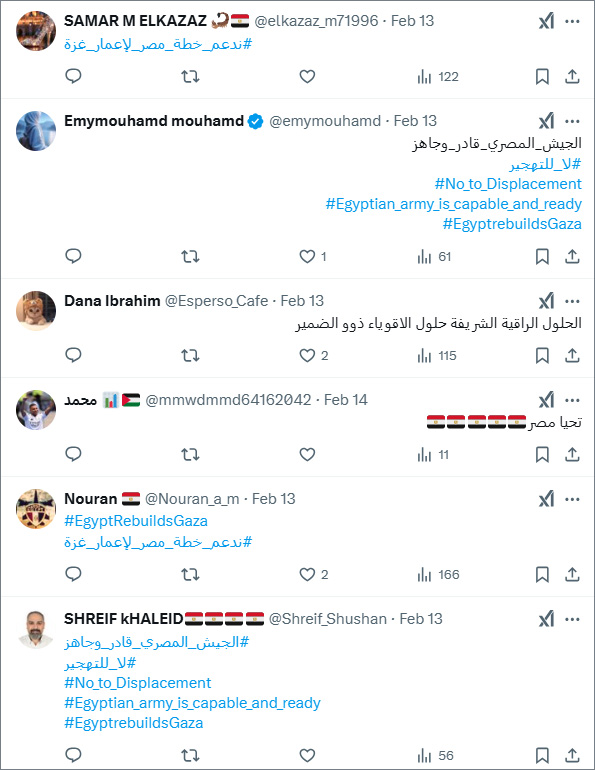
At the same time, speculative posts have surfaced, including one featuring an image of Egyptian military personnel using a motorized paraglider. The post suggests that Egypt may be preparing for an airborne operation inspired by Hamas’s October 7 attack, though experts argue that such training exercises are routine and not indicative of imminent military action.
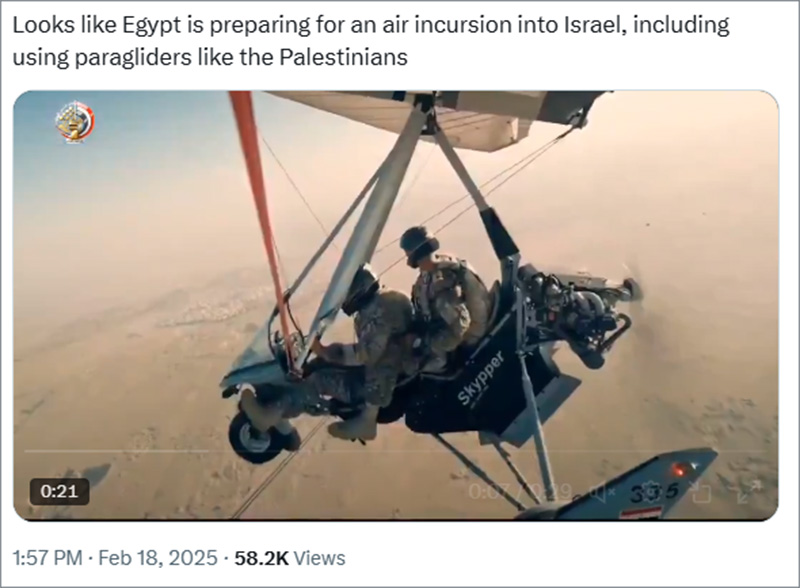
Amid rising nationalist sentiment, a viral video of an Egyptian military parade has further fueled online discourse. The footage showcases a large formation of tanks, armored vehicles, and troops, coinciding with a controversial statement by Egyptian lawmaker Mostafa Bakry, who claimed that Egypt could “capture Tel Aviv in a single day” if Israel “makes a mistake.”
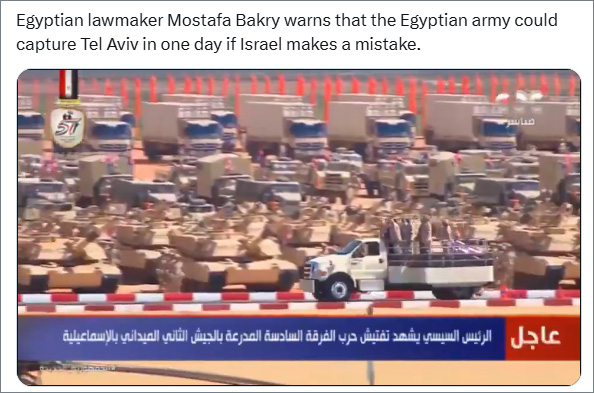
The online rhetoric has also revived historical comparisons. A widely circulated post featuring Egyptian tanks lined up in the desert, each bearing an Egyptian flag, warns against repeating past military miscalculations. The accompanying text references the 1967 Six-Day War, in which Israel swiftly defeated multiple Arab states, including Egypt, as a cautionary message against renewed conflict.
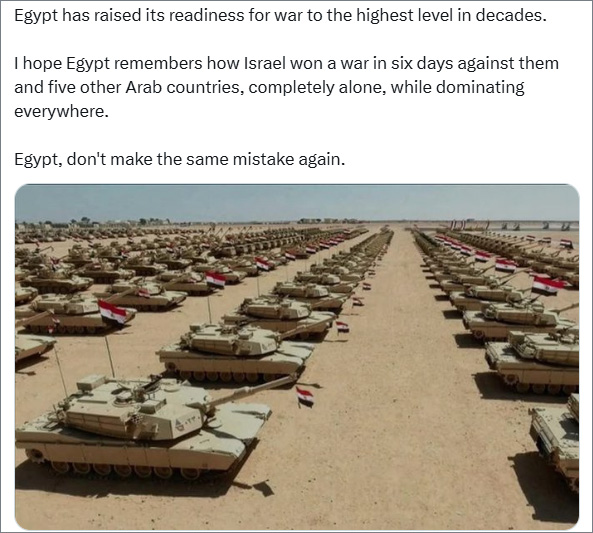
While tensions between Egypt and Israel have escalated over alleged military deployments in Sinai, the broader context suggests a mix of strategic posturing and political maneuvering rather than an imminent military confrontation. Both nations are balancing security concerns with diplomatic engagement, leveraging military displays and rhetoric as tools of influence rather than as direct preparations for war. As regional actors continue to navigate the shifting geopolitical landscape, the focus remains on maintaining stability while asserting strategic interests.
More from the author


